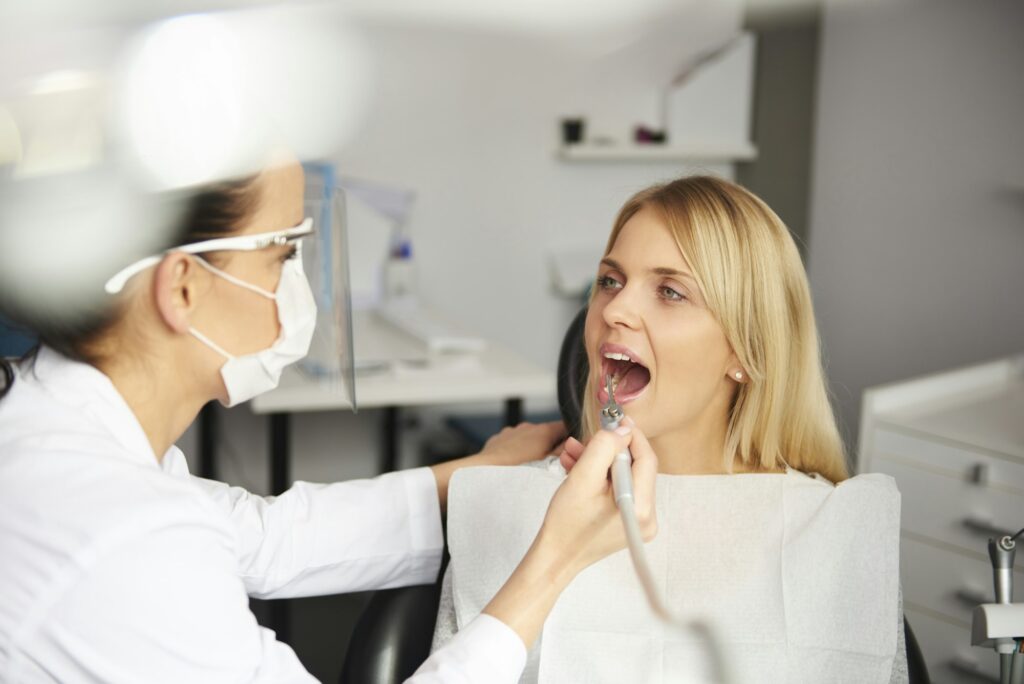
Oral hygiene is important for looks, breath and general health. Poor hygiene can lead to problems such as gum disease, infection, bone loss and heart disease. Regular checkups and cleanings can prevent these problems.

Recommended starting age: Age 3
We recommend seeing your child at age three.
Once your child is comfortable we proceed with the cleaning, taking necessary x-rays and providing a fluoride treatment and exam. We are committed to teaching each and every child good oral hygiene. Our hygienists use visual aids and mouth models, guide our young patient through problem areas inside his/her mouth on the television screen with the use of our intra-oral camera, and get your child involved in his/her oral health.
We do several things to make your child’s visit fun and positive. Sometimes this may consist of:
Sealants
Sealants fill the deep grooves on the chewing surfaces of the teeth to help prevent cavities. Prior to placing the sealant we use a special laser called a diagodent to check for decay. Sealants are done routinely on both six and twelve year molars.
Fluoride
We have both fluoride trays and fluoride rinses that we use to strengthen the enamel and aid in the prevention of decay.

Each patient’s individual needs are given special consideration. We begin by giving you a tour of your mouth with the use of our intra-oral camera, take necessary x-rays, perform a periodontal exam, provide a thorough cleaning and have one of our doctors give you a comprehensive exam, including oral cancer screening.
Gum disease vs. periodontal disease
Some patients require more than an “average” cleaning. If considerable time has lapsed since the last cleaning, the gum tissue may be infected, known as gingivitis. Gingivitis can progress into the deeper periodontal structure and bone leading into periodontal disease. Periodontal disease involves the bone and attachment of the underlying ligaments. In order to properly treat these types of needs we set the patient up with a soft tissue management program.
STM (soft tissue management program)
Our program is a conservative approach to treating, NOT curing, periodontal disease. If the tissue does not respond to treatment, you may possibly need further treatment by a periodontist depending on the severity of your case. Ultrasonic cleaner: This electric instrument has a vibrating tip that shoots out water and bacteria killing solutions. The ultrasonic is used to remove heavy deposits of tarter and irrigate (rinses) into deep pockets under the gum line.
Radiographs
Radiographs are two dimensional pictures that allow the doctor to look inside your teeth, where cavities or other problems begin even before they can be detected by the naked eye.
Air powder polisher
Air powder polisher: This high powered machine uses a combination of air, water and sodium bicarbonate. The solution along with the air pressure removes difficult surface stains from the teeth.
This question may seem basic, but it’s an important one. By asking it, you’re taking an active role in your dental wellness. Depending on the state of your oral health, your hygienist might tell you how to improve your brushing or flossing technique, which areas of your mouth to pay particular attention to, and what dental products they recommend you using at home.
Some people who see a little bit of pink in the sink while brushing or flossing their teeth may just assume that that’s a normal part of the process. If your gums bleed often while taking care of your dental health at home, it’s a good idea to ask your hygienist why that may be the cause. Bleeding gums could be a sign of bacteria build- up and gum disease.
Teeth sensitivity can be caused by many things, such as tooth decay, gum recession, diet, and teeth grinding. If you routinely experience tooth sensitivity, consult with your hygienist about how you can reduce your discomfort.